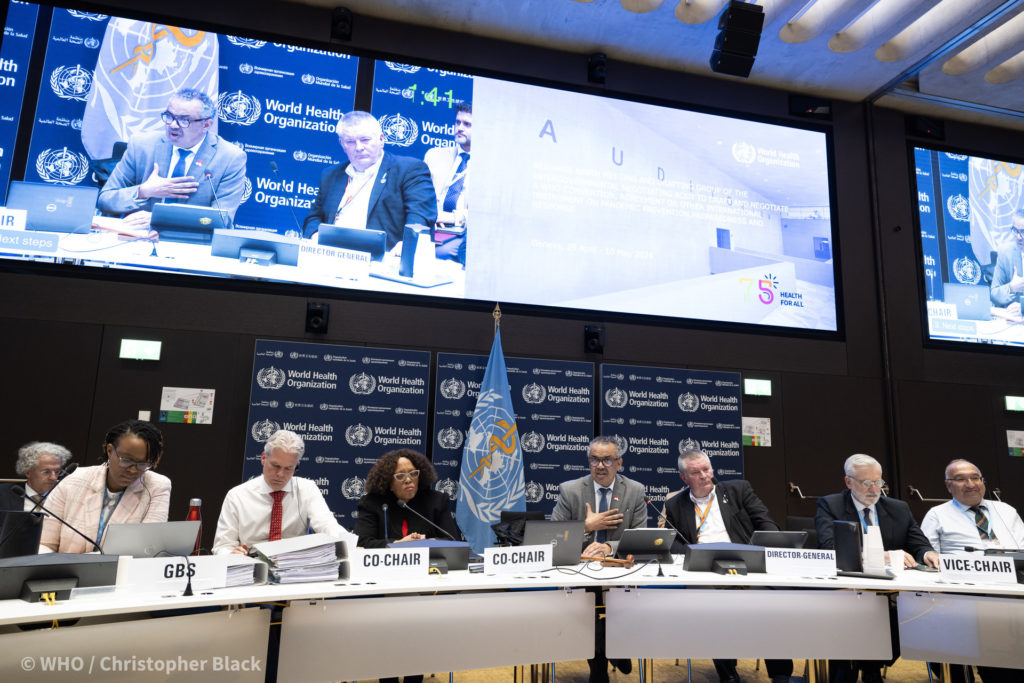
A day during the week of 16 December has been suggested for a World Health Assembly (WHA) special session to consider the pandemic agreement – but that is to remain strictly in pencil until there is clarity about the progress made in negotiations.
After two years of talks, including weeks of late-night meetings in the run-up to the WHA, World Health Organization (WHO) member states failed to meet the May deadline for the pandemic agreement.
But they are soldiering on from next week when the Intergovernmental Negotiating Body (INB) meets next Tuesday and Wednesday (16-17 July) for the 10th time.
The agenda of this meeting is largely concerned with process rather than content, as member states contemplate a pathway that may finally clinch an agreement.
New co-chairs?
Top of the agenda, which is not yet public, is the proposal to “rotate” members of the INB Bureau – and the possible election of two new co-chairs.
The Bureau, which runs the negotiations, consists of six regional representatives, including co-chairs Roland Driece from The Netherlands and South Africa’s Precious Matsoso.
Some member states have blamed the Bureau for the slow pace of talks, and there have also been complaints that some iterations of the draft agreements failed to reflect key positions and agreements.
The African Group has indicated that it wants to retain Matsoso and the agenda leaves the decision of the rotation of other Bureau members to the WHO regions.
At 11:32 CEST, the @WHO secretariat transmitted the advance unedited English versions of the provisional Agenda, draft programme of work, and Proposed workplan, meeting schedule and proposed updates, as appropriate, to the method of work to NSAs in official relations for #INB10 pic.twitter.com/3ETvojiikc
— Balasubramaniam (@ThiruGeneva) July 10, 2024
The second agenda item deals with the work plan, meeting schedule and proposed updates. This will take the bulk of the two-day meeting, bar a section on the consideration of other entities to be added as official stakeholders.
The work plan proposes a meeting from 4-15 November “focusing on the preamble, relevant sections of Article 1, Articles 3, 19, 20, 21, 24, 26, 31, 32, 33 and 34”, according to documentation sent this week to non-state actors in official relations with the WHO.
These articles cover, amongst others, the sticky issues of pathogen access and benefit sharing (PABS), One Health and access to health products during a pandemic.
The deadline for calling the WHA special session to discuss and adopt the pandemic agreement will be 15 November.
If there is no evident agreement by then, member states will need to agree on “an updated work plan and meeting schedule, depending on progress made,” according to the WHO documentation.
The 13th meeting of the INB will take place from 2 – 6 December and, all going well, will proceed to the WHA special session.
If there is no agreement and no special session, a 14th NB meeting has been scheduled for 24 – 28 February 2025.
The WHA gave negotiators up to a year – the next WHA in May 2025 – to reach agreement.
Civil society demands a place at INB table
WHO member states are also under pressure from civil society to open the talks up – at the very least to allow civil society organisations recognised as stakeholders in the pandemic preparation process to be present during negotiations.
More than 140 civil society organisations (CSO) and supporters from 40 countries issued an open call this week to the INB and WHO member states to “demand the official involvement of CSOs in all remaining negotiations in the INB process for a new pandemic agreement.”
CSOs that are identified as relevant stakeholders in the INB process – including patient advocacy groups, humanitarian organisations and pharmaceutical company representatives – have relied on “brief, piecemeal” interactions with negotiators for information.
The “failure to facilitate” their meaningful participation in the negotiation process “risks rolling back on best practice in global negotiations,” according to the call.
They want member states to “use the opportunity of the renewed INB mandate” to include CSOs, communities and academics in all INB meetings, and provide them with all documentation “in a timely manner”.
Meanwhile, a letter to the INB from The Elders, The Global Preparedness Monitoring Board, The Independent Panel for Pandemic Preparedness and Response, Pandemic Action Network, The Panel for a Global Public Health Convention, and Spark Street Advisors issued Wednesday also called for the process to be opened up.
Aside from opening that talks up to relevant CSOs and independent experts, the group proposes that co-chairs build trust by “explaining why certain texts were proposed”, ensure the “full representation of all member states” in working groups and provide timely information about the negotiations.
These measures will improve “effectiveness, transparency, and counter misinformation,” they note.
Image Credits: WHO .
Combat the infodemic in health information and support health policy reporting from the global South. Our growing network of journalists in Africa, Asia, Geneva and New York connect the dots between regional realities and the big global debates, with evidence-based, open access news and analysis. To make a personal or organisational contribution click here on PayPal.

